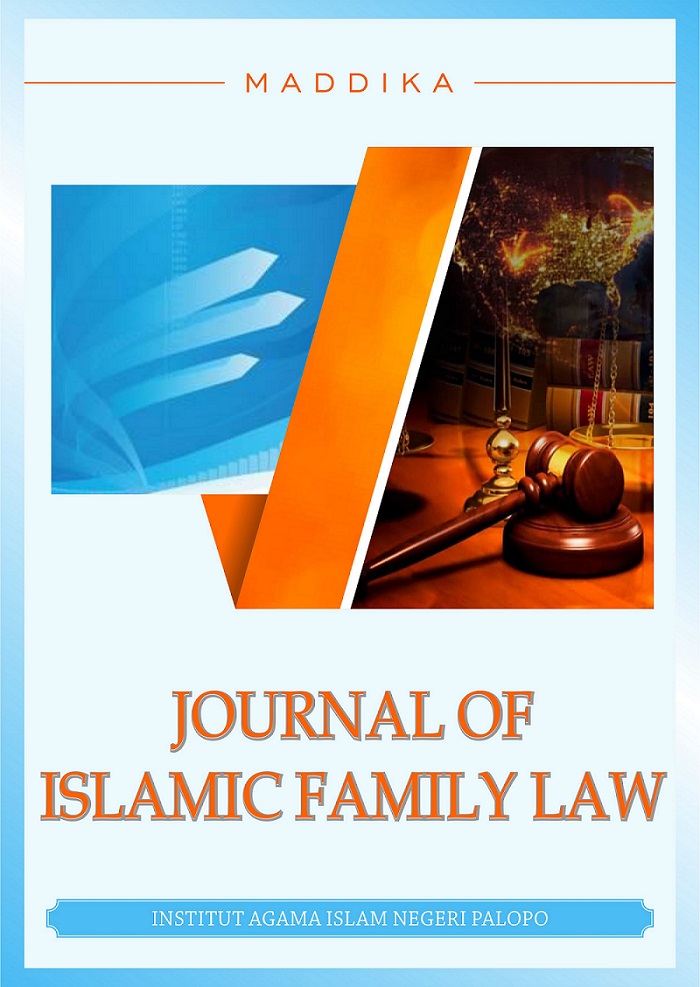NAFKAH DALAM KONTEKS HUKUM ISLAM
DOI:
https://doi.org/10.24256/maddika.v4i1.4837Keywords:
Islamic law, maintenance, familyAbstract
The purpose of writing this journal is to find out the concept of nafkah in Islam as well as the scope of legal aspects that govern, and its implications in everyday life. The research method in this study uses This type of research is descriptive qualitative using a literature study approach (Library Research). Library studies describe theoretical analysis, scientific studies, references, and literature related to local community habits, norms, and values that are built on the observed field conditions. With the method of collecting data and facts of information and exploring the sources contained in journals and scientific papers, encyclopedias, literature, and other data sources related and relevant to the topic, the formulation of the concept of Maqasid sharia in sharia retail marketing management can be formed through pre-existing theories. The research results in this study show that the concept of nafkah in Islam is not only about providing material needs but also includes broader aspects of life. The husband as the head of the family has a responsibility to his wife and children, a husband has obligations that Allah has set, including the rights of his wife and children that must be fulfilled, including the obligation to provide maintenance. The nafkah agreed upon by Islamic jurists is nafkah which is mentioned in the nash-nash syar'i and is a primary need in life for the wife. Understanding and implementing this concept is expected to improve the welfare of the people and strengthen the foundation of family life.
References
Al-Syarbini, Muhammad al-Khatib. “Mughni Al-Muhtaj.†2, 1958.
Bahri, Syamsul. “Konsep Nafkah Dalam Hukum Islam.†Kanun Jurnal Ilmu Hukum 17, no. 2 (2015).
Fatakh, Abdul. “NAFKAH RUMAH TANGGA DALAM PERSPEKTIF HUKUM ISLAM.†INKLUSIF (JURNAL PENGKAJIAN PENELITIAN EKONOMI DAN HUKUM ISLAM) 3, no. 1 (2018). https://doi.org/10.24235/inklusif.v3i1.2766.
Huda, Sokhi, and Ahmad Halimi Masruri. “NAFKAH IN FIQIH AND INDONESIAN LAW PERSPECTIVE ;†SHAKHSIYAH BURHANIYAH: Jurnal Penelitian Hukum Islam, 2022. https://doi.org/10.33752/sbjphi.v7i1.3937.
Ibnu `AbidÄ«n, Muḥammad AmÄ«n. Radd Al-MuḥtÄr `AlÄ Al-Durr Al-MukhtÄr Sharḥ TanwÄ«r Al-Abá¹£Ä. BeirÅ«t: DÄr Al-Kutub Al-`Ilmiyah, 1994.
Ismanto, Reno. “Standar Nafkah Wajib Istri Perspektif Fiqh Dan Kompilasi Hukum Islam.†ISLAMITSCH FAMILIERECHT JOURNAL, 2021. https://doi.org/10.32923/ifj.v2i01.1937.
Karimuddin, Karimuddin, Syahrizal Abbas, A. Hamid Sarong, and Afrizal Afrizal. “Standardisasi Nafkah Istri: Studi Perbandingan Mazhab Maliki Dan Mazhab Syafi’i.†Media Syari’ah : Wahana Kajian Hukum Islam Dan Pranata Sosial, 2021. https://doi.org/10.22373/jms.v23i1.8655.
Kementerian Agama, R I. “Al-Quran Dan Terjemahnya.†Jakarta: PT. Hati Emas, 2014.
Kumar, Rahul Richa. “Al-Muyassar / Kementerian Agama Saudi Arabia.†Frontiers in Neuroscience, 2021.
Mufidah, S, M R Iskandar, and ... “Pendapat Ibnu Qudamah Tentang Hukum Pernikahan Yang Direncanakan Untuk Perceraian.†… Hukum Keluarga Islam, 2017.
Rozali, Ibnu. “Konsep Memberi Nafkah Bagi Keluarga Dalam Islam.†Jurnal Intelektualita: Keislaman, Sosial Dan Sains, 2017. https://doi.org/10.19109/intelektualita.v6i2.1605.
Suwarno, Ayudya Rizqi Rachmawati dan Suparjo Adi. “Konsep Nafkah Dalam Keluarga Islam (Telaah Hukum Islam Terhadap Istri Yang Mencari Nafkah).†Asa 2, no. 1 (2020).
Syarifuddin, Amir. “Garis-Garis Besar Fiqih.†Jakarta: PT. Kencana, 2010.
Downloads
Additional Files
Published
How to Cite
Issue
Section
Citation Check
License
Copyright (c) 2024 Andi Muhammad Idin

This work is licensed under a Creative Commons Attribution-NonCommercial-ShareAlike 4.0 International License.
Authors who publish in this journal agree to the following terms:
- Authors retain copyright and grant the journal right of first publication with the work simultaneously licensed under a Creative Commons Attribution License that allows others to share the work with an acknowledgment of the work's authorship and initial publication in this journal.
- Authors can enter into separate, additional contractual arrangements for the non-exclusive distribution of the journal's published version of the work (e.g., posting it to an institutional repository or publishing it in a book), with an acknowledgment of its initial publication in this journal.
- Authors are permitted and encouraged to post their work online (e.g., in institutional repositories or on their websites) before and during the submission process, as this can result in productive exchanges and earlier and greater citations of published work.




















